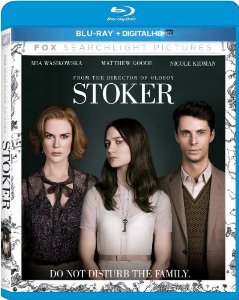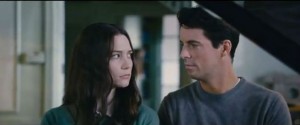 The last several years have seen talented, 23-year-old Australian actor Mia Wasikowska appear in an undeniably broad range of roles—from the titular curious British lasses of Alice in Wonderland (2010) and Jane Eyre (2011) to the addled American teens of The Kids Are All Right (2010) and Lawless (2012). With her latest film, this year’s Stoker (Fox, Blu-ray $29.99, DVD $22.98; available June 18, 2013), by noted South Korean filmmaker Chan-wook Park (Oldboy), Ms. Wasikowska receives an opportunity to take on her first genuinely creepy role.
The last several years have seen talented, 23-year-old Australian actor Mia Wasikowska appear in an undeniably broad range of roles—from the titular curious British lasses of Alice in Wonderland (2010) and Jane Eyre (2011) to the addled American teens of The Kids Are All Right (2010) and Lawless (2012). With her latest film, this year’s Stoker (Fox, Blu-ray $29.99, DVD $22.98; available June 18, 2013), by noted South Korean filmmaker Chan-wook Park (Oldboy), Ms. Wasikowska receives an opportunity to take on her first genuinely creepy role.
In Stoker, Ms. Wasikowska portrays India Stoker, a high school girl whose father dies on her 18th birthday, prompting an extended condolence call from her Uncle Charlie (Matthew Goode, A Single Man), an uncle she never even knew existed. The arrival of the mysterious relative grows even stranger when India’s newly widowed mother (Nicole Kidman, Rabbit Hole) takes an unnaturally strong interest in her deceased husband’s bro. Not surprisingly, this creates even more tension and discomfort in the already uneasy India.
Disc Dish had a sit-down with Ms. W and spoke with her about bringing her character of India to life and about her experiences working with Chan-wook Park on his first English-language film.
Disc Dish: Can you talk a little about your perception of your character and how it changed or grew over the course of the production?
Mia Wasikowska: When I first read the script, I had that same feeling that I hoped that audience had about not knowing what side India was going to fall on. Is she going to a hero or anti-hero. I liked that until the end we were guessing and still had questions as to who she was.
DD: Did you like her?
 MW: Oh yes. I had always thought of her positively and director Park talked about her in quite an innocent way. He put it to me that Stoker was a coming-of-age story and a twisted fairy tale. And that although India realizes herself in a darker way, in the beginning she has very regular teenage desires and feelings. And director Park stressed that.
MW: Oh yes. I had always thought of her positively and director Park talked about her in quite an innocent way. He put it to me that Stoker was a coming-of-age story and a twisted fairy tale. And that although India realizes herself in a darker way, in the beginning she has very regular teenage desires and feelings. And director Park stressed that.
DD: Describe your experience of working with director Park in his first English language film.
MW: It was pretty great. I’ve never before worked with anybody who storyboarded a movie from start to finish. That was pretty unique – it was so concise and that’s not usually the case with films. Yeah it was pretty brilliant. The obvious difficulty is that he didn’t speak English and we communicated through a translator, but it’s something that was so small that within a couple of days we didn’t even notice.
DD: Was there a lot of pointing and such?
MW: Very much. Matthew [Goode] puts it well when he says there was a lot of gesticulation. Is that the right word?
DD: It was such a visually striking movie. It was all storyboarded, yes, but were you surprised with the finished product and how it looked?
MW: Very much so. Although it was storyboarded, it was still changed quite a lot during the shooting—he modified things as we went along. It’s a very visual film and often director Park would explain how a shot was going to work, but there were a lot of times when we still couldn’t imagine how it was going to look. So it was very interesting to see the final film, and see how he articulated those things that were in his head.
DD: Did you have a favorite visual sequence?
MW: I like the whole egg metaphor, which runs though the whole film. That goes particularly for my character, which he had always seen as a little chick pecking out of its eggshell. If you closely at some of the chairs in the house, they’re sort of egg-shaped. At one point, behind India’s head, there are five white plates in a circle and one yellow one in the middle, like an egg yoke.
DD: Please tell us about the piano duet scene.
MW: It was written very intensely, sort of like a love scene. It was one of my more favorite days on the set because India is a very closed off character and for a lot of the film a lot is held back. The piano scene is one of the scenes where the character allows herself to be swept away a little bit more. Also, we filmed it with the music and sound is an element that you don’t always get while you’re filming.
DD: Stoker has a South Korean director, British actor and Australian actresses and it’s a very American film with a uniquely American setting, at least at first glance.
MW: Director Park wanted it to feel timeless and really non-specific as to setting. It is quite an American film, but he still wanted it to be any time period or any location.
DD: A part of the film is about blood. What did you think about when it came to the blood in the film?
MW: Director Park put it really well when he said rather than it being about bad blood and evil in the bloodline, maybe it’s more about violence being contagious. We really don’t know what would have happened to India if Uncle Charlie hadn’t showed up. Blood is another symbol.
DD: Do you have any stories about working with Nicole Kidman?
MW: She was just so open and kind and warm from the very beginning. She really took me under her wing. And it was great to watch her work because she really tries a whole array of things. She’s really bold as a person and an actress—she’s not embarrassed or self-conscious in any way.
DD: The story and suspense are very Hitchcock-inspired and I kept thinking about all those Hitchcock heroines played by Ingrid Bergman and Joan Fontaine. Did you watch any of Hitchock movies before production began?
MW: I didn’t watch any specifically for this film, but I’ve watched many previously. The link to Hitchcock has more come about now rather then when we were filming. It had been mentioned, but it was never pressed when were shooting.
DD: Director Park has mentioned that it was a very fast shoot—about a month or so. Were there light moments off the set? I’m trying to imagine what a night out with Director Park and Uncle Charlie would have been like.
MW: It was very jovial when we weren’t on set. Everyone had a light spirit. Me and Matthew had a Saturday night tradition of hitting up the honky-tonk bars in Nashville and going from country bar to country bar. We had a lot to blow off on the weekends after playing such intense characters. But often on the more serious films, things tend to get sillier quicker—out of necessity maybe.
|
Buy or Rent Stoker
|
|||
|---|---|---|---|
DVD Instant HD Video |
 DVD | Blu-ray DVD | Blu-ray |
 DVD | Blu-ray DVD | Blu-ray |
|

Leave a Reply